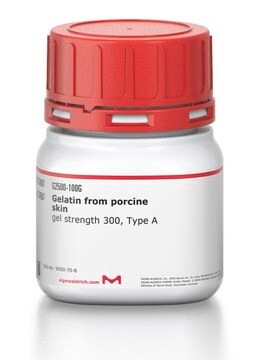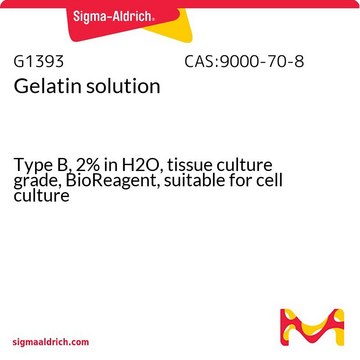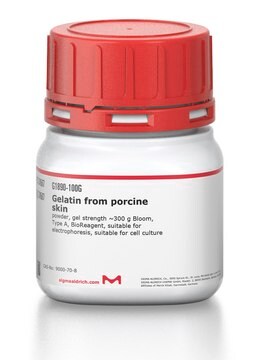ESG2207
ESGRO® Recombinant Rat LIF Protein
ESGRO Leukemia Inhibitory Factor (LIF) supplement for rat ES cell culture. Each vial contains 10^7 units/ml
Sinónimos:
Rat LIF
Iniciar sesiónpara Ver la Fijación de precios por contrato y de la organización
About This Item
UNSPSC Code:
12352202
eCl@ss:
32160801
NACRES:
NA.75
Productos recomendados
Quality Level
assay
>85% (active component rat LIF (rtLIF), SDS-PAGE)
form
liquid
manufacturer/tradename
Chemicon®
concentration
10000000 units/mL
technique(s)
cell culture | stem cell: suitable
input
sample type induced pluripotent stem cell(s)
sample type: mouse embryonic stem cell(s)
UniProt accession no.
shipped in
dry ice
General description
Applications for Rat ESGRO include use as a reagent for the in vitro maintenance of rat ES cells. Studies have demonstrated that rtLIF is more effective in maintaining the undifferentiated phenotype of rat ES cells than similar concentrations of murine LIF.
Product Source: rtLIF is expressed in E. coli as a fusion protein with GST using the pGEX expression system, cleaved from GST moiety with thrombin and purified by ion-exchange chromatography.
Application
Applications for Rat ESGRO include use as a reagent for the in vitro maintenance of rat ES cells. Studies have demonstrated that rtLIF is more effective in maintaining the undifferentiated phenotype of rat ES cells than similar concentrations of murine LIF (Takahama et al. 1998).
Rat ES Cells: RtLIF produced from a transfected cell line, has been shown to effectively maintain the undifferentiated phenotype of rat ES cells when used at a concentration of 1000-1500 units / mL (Takahama et al. 1998).
At this recommended concentration 106 units of ESGRO is sufficient for 1L of tissue culture media.
Visit www.esgro-lif.com for additional information
Rat ES Cells: RtLIF produced from a transfected cell line, has been shown to effectively maintain the undifferentiated phenotype of rat ES cells when used at a concentration of 1000-1500 units / mL (Takahama et al. 1998).
At this recommended concentration 106 units of ESGRO is sufficient for 1L of tissue culture media.
Visit www.esgro-lif.com for additional information
ESGRO Leukemia Inhibitory Factor (LIF) supplement for rat ES cell culture. Each vial contains 10^7 units/ml
Packaging
1 mL
Quality
The highest standards of quality control are used in the manufacture of this product. No warranty is provided that the sale or use of the product either alone, in combination with other products, or in the operation of any process, will not infringe patent, intellectual property or any other rights of third parties. This product is supplied for research purposes only. It is not for human therapeutic and/or diagnostic use.
Caution
Note: LIF should not be allowed to come in contact with ruminant or swine.
Physical form
Format: Purified
Purified, sterile liquid. Rat ESGRO is supplied in liquid form as 107 Units ESGRO in 1.0 mL of 50mM sodium phosphate/1mM DTT / 10% glycerol / 250mM NaCl with 1% w/v bovine serum albumin BSA as a carrier for stability.
Rat ESGRO is supplied 0.22 micron sterile filtered, and tested negative for mycoplasma.
Rat ESGRO is supplied 0.22 micron sterile filtered, and tested negative for mycoplasma.
Storage and Stability
Rat ESGRO is shipped on dry ice. This product is stable for at least 12 months from the date of manufacture, in the concentrated form or diluted in sterile tissue culture media, with no loss of activity on ES cells.
For long term storage it is recommended that Rat ESGRO concentrate be stored at -20°C.
It is recommended that prior to use, Rat ESGRO should be diluted in sterile tissue culture media and aliquoted to a convenient concentration, then stored at -20°C. Freeze thawing will reduce potency and is not recommended.
For long term storage it is recommended that Rat ESGRO concentrate be stored at -20°C.
It is recommended that prior to use, Rat ESGRO should be diluted in sterile tissue culture media and aliquoted to a convenient concentration, then stored at -20°C. Freeze thawing will reduce potency and is not recommended.
Analysis Note
Specific Activity: Rat ESGRO® is assessed both on murine ES {embryonic stem} cells (MBL-1) and on murine M1 myeloid leukemic cells.A standard of 50 Units is defined as the concentration of Rat ESGRO in 1.0mL of tissue culture medium that induces the differentiation of 50% of M1 colonies.106 units is equivalent to approximately 10 μg of pure protein, and is sufficient to treat 1L of ES cell culture media.Embryonic Stem Cell Assay: Differentiation inhibition at 1000 units/mLMurine myeloid leukemic, M1 Assay: Specific Activity >108 units/mg
Legal Information
CHEMICON is a registered trademark of Merck KGaA, Darmstadt, Germany
ESGRO is a registered trademark of Merck KGaA, Darmstadt, Germany
Disclaimer
Unless otherwise stated in our catalog or other company documentation accompanying the product(s), our products are intended for research use only and are not to be used for any other purpose, which includes but is not limited to, unauthorized commercial uses, in vitro diagnostic uses, ex vivo or in vivo therapeutic uses or any type of consumption or application to humans or animals.
Storage Class
10 - Combustible liquids
wgk_germany
WGK 2
Certificados de análisis (COA)
Busque Certificados de análisis (COA) introduciendo el número de lote del producto. Los números de lote se encuentran en la etiqueta del producto después de las palabras «Lot» o «Batch»
¿Ya tiene este producto?
Encuentre la documentación para los productos que ha comprado recientemente en la Biblioteca de documentos.
Establishment of rat embryonic stem cell lines that can participate in germline chimerae at high efficiency.
Hirabayashi M. et al.
Molecular Reproduction and Development null
Generation of germline-competent rat induced pluripotent stem cells.
Hamanaka S. et al.
Testing null
Shinobu Ueda et al.
PloS one, 3(7), e2800-e2800 (2008-07-31)
The rat is a reference animal model for physiological studies and for the analysis of multigenic human diseases such as hypertension, diabetes, neurological disorders, and cancer. The rats have long been used in extensive chemical carcinogenesis studies. Thus, the rat
Nuestro equipo de científicos tiene experiencia en todas las áreas de investigación: Ciencias de la vida, Ciencia de los materiales, Síntesis química, Cromatografía, Analítica y muchas otras.
Póngase en contacto con el Servicio técnico







